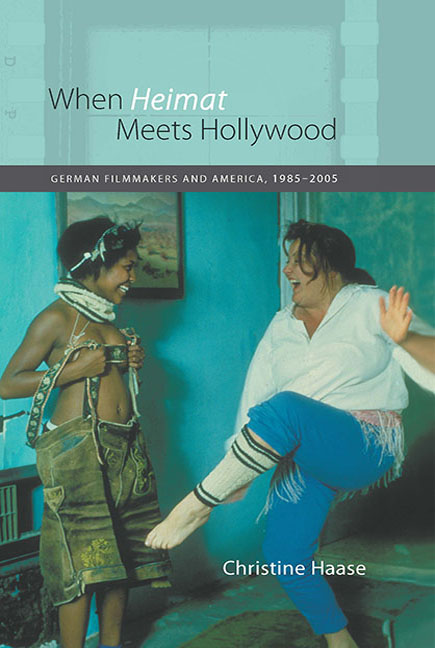Book contents
- Frontmatter
- Dedication
- Contents
- Acknowledgments
- Introduction
- 1 German and American Film Relations in the Twentieth Century
- 2 Wolfgang Petersen: Blockbuster Auteur?
- 3 “Foil, Toothpaste, ID4”: Ideology and Global Appeal in the Films of Roland Emmerich
- 4 Crossing Boundaries, Connecting People: The German-American Films of Percy Adlon
- 5 “Bambi, Zombie, Gandhi”: The Cinema of Tom Tykwer
- Conclusion
- Works Cited
- Index
Introduction
Published online by Cambridge University Press: 11 May 2017
- Frontmatter
- Dedication
- Contents
- Acknowledgments
- Introduction
- 1 German and American Film Relations in the Twentieth Century
- 2 Wolfgang Petersen: Blockbuster Auteur?
- 3 “Foil, Toothpaste, ID4”: Ideology and Global Appeal in the Films of Roland Emmerich
- 4 Crossing Boundaries, Connecting People: The German-American Films of Percy Adlon
- 5 “Bambi, Zombie, Gandhi”: The Cinema of Tom Tykwer
- Conclusion
- Works Cited
- Index
Summary
Setting the Scene
From its inception in the nineteenth century, film has been a medium with transcultural and transnational appeal. The history of the cinema has always been a story of complex connections and collaborations between different national and cultural traditions as well as between people of different countries, ethnicities, genders, religions, and classes. Before the advent of synchronized sound, film — resting on the notion of images as a form of visual lingua franca — could cross borders with relative ease, requiring only the translation and substitution of intertitles. With the development of sound, this transnational aspect of motion pictures became more problematic, and a more nationally oriented cinema began to thrive. The category of the national in regard to film — contested and complicated as it may be — hence provides a strong counterpoint to that of the transnational. As film scholar Sabine Hake points out: “The cinema … has from the beginning provided an important forum for debates about culture, politics, and society, and it continues to serve as an instrument of innovation, provocation, and critical reflection. This function has been especially pronounced in relation to questions of national culture and identity.” Moreover, according to media studies scholar Martin Conboy, film in Germany has not only “always provided a useful means of articulating national aspirations and mood of the country,” the cinema also, “as a popular cultural form … became an important means of expressing a specifically German identity.” Films hence are both global products — made, traded, and consumed across national borders — and important vehicles for projects of the national. As aesthetic object, cultural product, and capitalist commodity, the cinema therefore encompasses elements pivotal to both localism and internationalism. Given this fluctuation between national significance and transnational production and reception, investigations into film often oscillate between the national and the international, with the latter frequently represented by Hollywood in its global reach. In fact, Hake wonders “whether the renewed attention to national cinema marks the return of the national as a category of difference in, if not resistance to, the leveling effect of a global cinema culture ruled by Hollywood.”
- Type
- Chapter
- Information
- When Heimat Meets HollywoodGerman Filmmakers and America, 1985–2005, pp. 1 - 13Publisher: Boydell & BrewerPrint publication year: 2007



